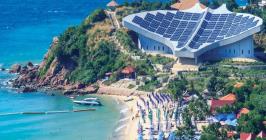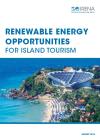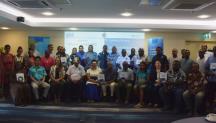

Renewable Energy Opportunities for Island Tourism
Newsletter
Tourism is an important economic driver for island economies. Energy supply, vital for the tourism industry, is still dominated by oil products which increases islands’ vulnerability to the environmental impact of fossil-fuel use, as well as to oil price volatility, which makes it difficult for the industry to remain competitive.
This report from the International Renewable Energy Agency (IRENA) analyses four renewable energy technologies (RETs), namely, solar water heating (SWH), solar air conditioning (SAC), seawater air conditioning (SWAC) and solar photovoltaic (PV) systems. Analysis confirms that the use of these systems can boost the competitiveness of the island tourism sector significantly.
In addition to economic benefits derived from reduced energy costs, a transition to renewable energy can reinforce sustainable tourism marketing strategies, which can increase tourist arrivals and allow for higher room rates. Accelerated deployment of renewables also improves the well-being of island communities by reducing air and water pollution from fossil-fuel combustion and spillages, along with creating employment opportunities.
The report provides insights for:
Policymakers
- Renewable Energy Opportunities for Island Tourism offers governments with detailed information on the advantages of RETs, enabling policies and best practices, and RET deployment case studies in island tourism facilities.
Development partners
- Policies to strengthen local capacity are discussed together with interventions that can improve the private sector investment environment. Best practices and case studies show how the support of international financial institutions can contribute to the successful deployment of RETs in island tourism.
- While presenting a strong business case for investments in RETs, the report also describes barriers that hinder their deployment in island tourism. Development partners can assist countries to remove these barriers through policy formulation and evaluation, preparation of feasibility studies, strengthening of project proposals, and improving access to multilateral financing.
Renewable energy companies and power utilities
- Acknowledging the need for a stable and conducive investment environment to manufacture, sell and install renewable energy technologies, the report reviews enabling policies and best practices that can facilitate access to funding for tourism operators to deploy RETs.
Hotel chains, hotel managers and tourism operators
- International best practices and case studies that showcase successful renewable energy projects in island tourism are outlined, in order to inform hotel chains, hotel managers and other tourism operators on how to deploy RETs. By making use of RETs, the tourism sector can strengthen its sustainable development and marketing strategies, reduce its operating costs and lower its footprint through the reduced import of fossil fuels.
Several case studies provide examples of cost-effective renewable energy solutions.




